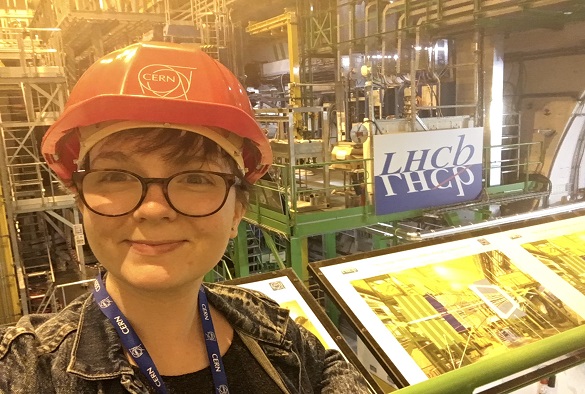Liverpool student awarded grant from innovative Institute of Physics Research-scholarships fund
Published on

Abbie Chadwick from the University of Liverpool’s Department of Physics has been awarded one of this year’s prestigious grants from the Bell Burnell Graduate Scholarship Fund.
Abbie is studying for a PhD in particle physics and her research covers two areas within the Large Hadron Collider beauty (LHCb) experiment at CERN. She aims to understand the weak mixing angle discrepancy within the standard model which will help probe the standard model. She is also involved in commissioning of the VELO upgrade in the experiment and this includes testing the VELO detector to check its operations.
Abbie has struggled with undiagnosed dyslexia for most of her school life and has overcome ill-health during her studies which has meant that her PhD has been more of a challenge than it should have been. The Bell Burnell Graduate top-up scholarship will support her to complete her studies.
She said: “My PhD is something I’ve always wanted to do and believe I can do, despite the barriers I’ve faced, and continue to face. Receiving the fund is helping me to achieve that goal on both a practical level but also an emotional one. Knowing the panel believed in me enough to grant a scholarship is something that I will never stop being grateful for.”
The Bell Burnell Graduate Scholarship Fund was set up by leading physicist Professor Dame Jocelyn Bell Burnell and the Institute of Physics (IOP) to encourage diversity in physics by assisting talented students from under-represented groups to study PhD physics.
Dame Jocelyn, a former president of the IOP, was awarded the 2019 Special Breakthrough Prize in Fundamental Physics for her role in the discovery of pulsars, and for her continued scientific leadership and engagement with the scientific and wider communities.
The Breakthrough Prize award included £2.3m, which she immediately donated to the IOP to help counter what she described as ‘the unconscious bias that still exists in physics research’ saying: "I don't need the money myself, and it seemed to me that this was perhaps the best use I could put it to."
The Bell Burnell Graduate Scholarship Fund was the result. It is a doctoral scholarships fund that aims to encourage diversity in physics, by assisting students from groups under-represented in the physics research community to undertake physics PhD programmes.
Rachel Youngman, Deputy Chief Executive of the Institute of Physics, commented: “This year I am delighted we are supporting nine well deserving students to further their studies and build their careers in physics. We need physicists in order to rise to the economic challenge of building a zero-carbon economy and the more diverse we can make our pool of physics researchers and innovators the stronger and more creative it will be.
“The fund set up by Dame Jocelyn is already helping to achieve this. To date, it has enabled 21 students to embark upon a physics PhD, helping them to start their journey to a rewarding and exciting career.
“Among those we have assisted so far are a young woman who embarked upon research into radiographic analysis tools for cancer detection, a young man whose parents were forced to flee violence and discrimination in their homeland, who was able to pursue cosmology research, and a young woman who went onto a PhD programme to develop an infrared detector capable of non-invasively measuring blood glucose.
“There is no doubt that this fund will ultimately benefit many people, and I am delighted to congratulate this year’s awardees.”
In 2019/20, just 25% of physics undergraduate students were female1. This has increased from 22% in 2010/112, but still does not reflect the proportion of the population who are female.
Professor Helen Gleeson, Cavendish Professor of Physics at the University of Leeds and IOP Representative to Council for Inclusion and Diversity, is the Chair of the Bell Burnell Graduate Scholarship Fund Committee. She said:
“Once again it was extremely difficult to decide upon the awardees; the competition was tough. It is such a pleasure though to be helping nine very worthy students this year. The successful applicants are all involved in exciting research projects that will bring benefits to all of us, and will also be inspiring others in their roles as ambassadors for the programme. As ever, I am delighted to be able to help them on their career journeys.”
You can read more about Abbie’s story at the Institute of Physics website.